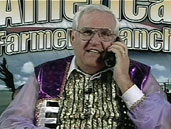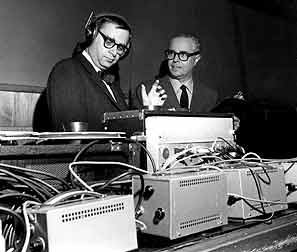Happy New Year! The following article ran on Commander Trombone in 2005.
As you might or might not expect, Commander Trombone has by this time played numerous gigs on the trombone. Trust me, if you were to read my résumé, you’d quickly see that the word numerous is used numerous times in regard to gigs.

The Show’s On:
Big Joe alerts the neighbors
Some time ago, one of the aforementioned gigs was playing trombone on a cruise ship. I played in the show band. As its name suggests, the show band played for the cruise ship shows. It was a kind of all-purpose musical organization whose functions included “playing on” comedians, jugglers, and magicians, playing with the occasional competent singer, and playing light dance music for the older cruising demographic. The show band did not play top forty cover tunes or Texas Two-beat — there were other bands on board for that sort of thing. For dancing, we played simple adaptations of big-band tunes, waltzes, tangos, etc.
After a long night of shows for the cruisers, the show band was often obliged to play a late-night dance set. When we needed to clear the room — perhaps because we had had enough and wanted to retire to our cabins or the bar for the evening — one kind of tune was guaranteed to get the job done: a polka. Almost always, a simple rendition of Pennsylvania Polka would be enough to make our listeners lose interest and wonder what was being served at the Midnight Buffet.
Make no mistake, however: Polkas are a constant fountain of joy for some. Specifically, happy people. To clarify a bit, not all happy people are polka lovers, but polka lovers are generally happy people. In fact, that’s how Big Joe describes his polka-dance show: Happy Music for Happy People.
If you’ve never heard of Big Joe or the Big Joe Show, it’s probably time you did. Currently, the program airs Wednesday and Saturday night on RFD-TV, a network that is carried by Dish Network and DirectTV.
The Big Joe Show is a polka dance show. It’s not your father’s dance show like American Bandstand or Soul Train, it’s your grandfather’s dance show — if your grandfather really liked polka.
Even if you aren’t particularly a polka fan, you may find the Big Joe Show endlessly fascinating. There are three basic reasons for this phenomenon:
- Big Joe himself, who is always clad in a colorful, shiny, piano vest and cummerbund. Who lives, sleeps, and eats polka? Big Joe does.
- All the bands on the show are live bands, featured in the same space as the actual dancers. The quality of the bands varies greatly — some are quite good, but there is the occasional tubist whose batting average in relation to hitting the correct notes is quite low. You get the picture — tuba farts to a polka beat.
- The dancers. There won’t be any of the self-conscious dancing you see on the MTV. These are not self-consciously “cool” people. These are simply happy people. Remember — happy music for happy people?
The production values on The Big Joe Show vary greatly. For example, a typical episode features video that turns from hazy and washed-out to completely clear depending on the camera and camera angle being used at a given moment. This camera effect, combined with the styles of eyeglasses and hair, make it harder to guess what decade all this dancing and merriment is taking place in.
Below are some Quicktime samples of the show. If you can, though, tune in and turn on to the Big Joe Show at the next available opportunity.
Big Joe’s Commercial for CDs:
Joe Beno Band with an introduction by Big Joe:





